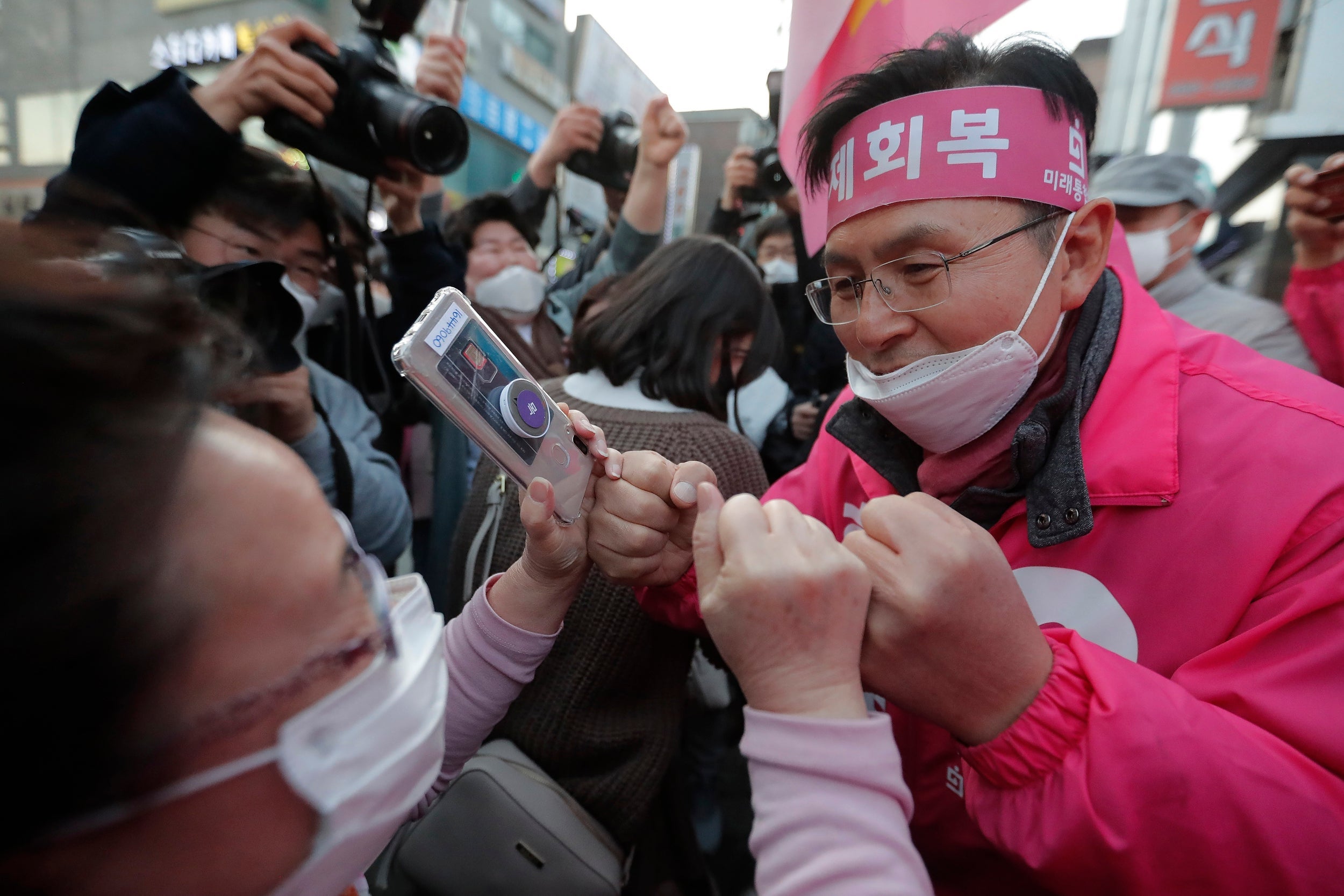South Korea votes in first national election held during coronavirus pandemic
Moon Jae-in's centre-left Democratic Party expecting boost at ballot box from positive perceptions of his handling of crisis

Your support helps us to tell the story
From reproductive rights to climate change to Big Tech, The Independent is on the ground when the story is developing. Whether it's investigating the financials of Elon Musk's pro-Trump PAC or producing our latest documentary, 'The A Word', which shines a light on the American women fighting for reproductive rights, we know how important it is to parse out the facts from the messaging.
At such a critical moment in US history, we need reporters on the ground. Your donation allows us to keep sending journalists to speak to both sides of the story.
The Independent is trusted by Americans across the entire political spectrum. And unlike many other quality news outlets, we choose not to lock Americans out of our reporting and analysis with paywalls. We believe quality journalism should be available to everyone, paid for by those who can afford it.
Your support makes all the difference.South Korea goes to the polls on Wednesday, becoming the first country to conduct a national election since the beginning of the coronavirus pandemic.
Despite its proximity to China, the country has been able to avoid a lockdown through an aggressive “trace, test and treat” operation, testing more cases per capita than anywhere else in the world.
Measures have been put in place to ensure the parliamentary vote can be carried out safely. Polling stations will take voters’ temperatures upon arrival, and anyone registering higher than 37.5C will be directed to a special booth.
Voters will also be required to wear masks at all times, use hand sanitiser upon arrival and, before using the voting machines themselves, put on disposal plastic gloves.
Despite the additional inconvenience, a record number of people - more than five million - exercised the option to cast their ballot early on Friday. Officials had hoped for a high early turnout to reduce crowding at booths for the main event.
Those early voters included the president Moon Jae-in, who as the incumbent would have been expected to see his party struggle in a normal Korean election.
Instead, his perceived success in dealing with the country’s virus epidemic could translate to a boost for his party at the ballot box. Opinion polls suggest some 60 per cent of the public think he has responded well to the Covid-19 crisis, and his personal approval ratings hit a 16-month high last week.
Success for Mr Moon’s centre-left Democratic Party will allow him to implement his agenda in the final two years of his administration more easily.
South Korea only reported 27 new cases on Tuesday, bringing its total up to 10,564, according to the Korea Centres for Disease Control and Prevention. Despite receiving its first confirmed case as early as 20 January, the country has suffered just 217 deaths from the virus.
Special measures are being put in place so that everyone can cast their vote on Wednesday - even those currently battling the disease.
More than 7,000 people have recovered from the virus, and the national election commission said it had set up eight designated polling stations for the more than 3,000 coronavirus patients currently receiving treatment, as well as for medical staff in Seoul and Daegu, among the hardest-hit areas.
Campaigning ahead of Wednesday’s vote has faced significant disruption as a result of the virus. Candidates have been unable to hold large rallies, instead meeting voters in smaller meetings while wearing masks, and swapping typical handshakes for fist and elbow bumps.
“We're refraining from large rallies as much as possible and also limiting personal contact,” said Lee Nak-yon, a former prime minister running for the parliament.
The head of the main opposition United Future Party, Hwang Kyo-ahn, took part in a photo opportunity disinfecting residential areas. The party criticised the government over the virus in its messaging at the start of the outbreak, but has eased off as the Moon administration has won international recognition, not least from the WHO itself.
Voting on Friday in Seoul, 22-year-old Kim Ju-yeon told Reuters she was happy with the safety measures put in place by officials. “It was a little uncomfortable since I had to put on plastic,” she said, referring to the gloves she had to wear. “But because voting is a must, the experience was reassuring.”
Subscribe to Independent Premium to bookmark this article
Want to bookmark your favourite articles and stories to read or reference later? Start your Independent Premium subscription today.
Join our commenting forum
Join thought-provoking conversations, follow other Independent readers and see their replies
Comments